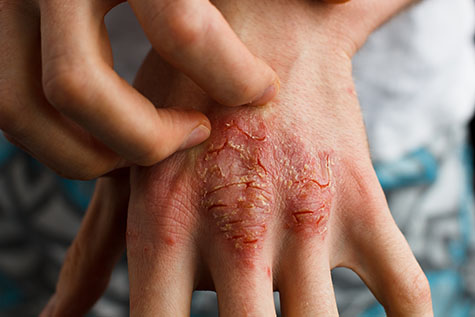What Causes Eczema?

The causes of eczema are believed to include:
- Genetics
- Autoimmune response
- Skin irritants
Atopic dermatitis, an eczema that begins at childhood, tends to be related to allergies and asthma. If you have eczema, you also likely have triggers for flare ups.
What Types of Eczema Are There?
There are many types of eczema, which are categorized by specific symptoms. These include:
- Atopic dermatitis
- Dyshidrotic eczema
- Hand eczema
- Nummular eczema
- Stasis dermatitis
Who Gets Eczema?
Both children and adults may have eczema. However, most infants or children who have the condition from an early age outgrow it by around age four or five.
Even if you never had eczema as a child, you may develop the condition later in life. Most adult-onset eczema occurs in your 50’s, but anyone of any age can develop new-onset eczema.
Finally, you are more likely to have eczema if you also suffer from allergies or asthma or if you have a family history of eczema.
How Can I Prevent Eczema?
Eczema flare-ups can be prevented by maintaining your skin’s moisture and avoiding your triggers. Your dermatologist can help you identify triggers, and you can keep a journal or list of potential triggers as you notice flare-ups. Common eczema triggers include:
- Irritants such as fragrances, household products, dyes, etc.
- Allergens, including environmental, seasonal, and food allergens
- Stress
- Extreme hot or cold temperatures
Why Treat Eczema?
Eczema can induce persistent and bothersome itching and leave behind darkened or pink dry patches. Without the help of a dermatologist, it can be difficult to control eczema flare-ups and prevent breakouts in the future.
How Can I Treat Eczema?

A board-certified dermatologist at Arlington Dermatology will create a treatment plan for your eczema tailored to your age, the subtype of eczema, and specific symptoms. Depending on your case, your board-certified dermatologist at Arlington dermatology may recommend a gentle skincare routine, light therapy (nbUVB), topical medications, or systemic medications (oral or injectable) to reduce flare-ups and prevent new ones. Our providers are very experienced with prescription medications for eczema including topical steroids, non-steroidal anti-inflammatories, pills, or injectable medications such as Dupixent, but will also utilize non-prescription management. Maintenance and flare prevention are also important and our board-certified dermatologists will help you identify your eczema triggers and explain how you can best avoid them.

Schedule an Appointment
If you’re struggling with eczema, a board-certified dermatologist at Arlington Dermatology can help find a solution for you. Rather than suffering through a persistent itch-scratch-itch cycle, visit a qualified, experienced dermatologist to resolve flare-ups and prevent them in the future.
To schedule an appointment with Arlington Dermatology, please call our office or request your appointment online.


